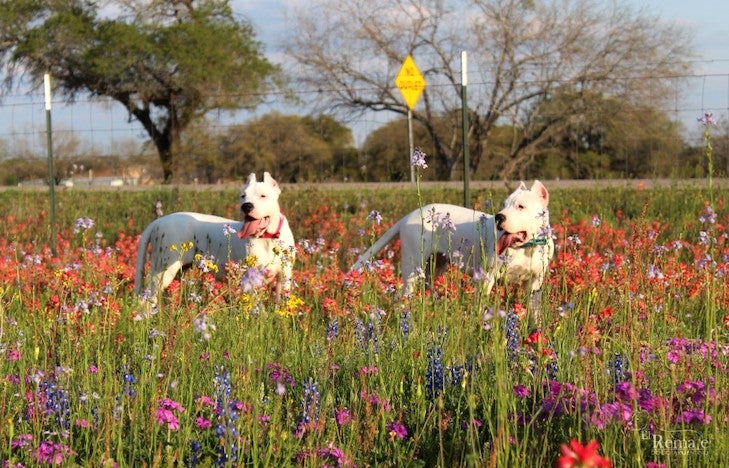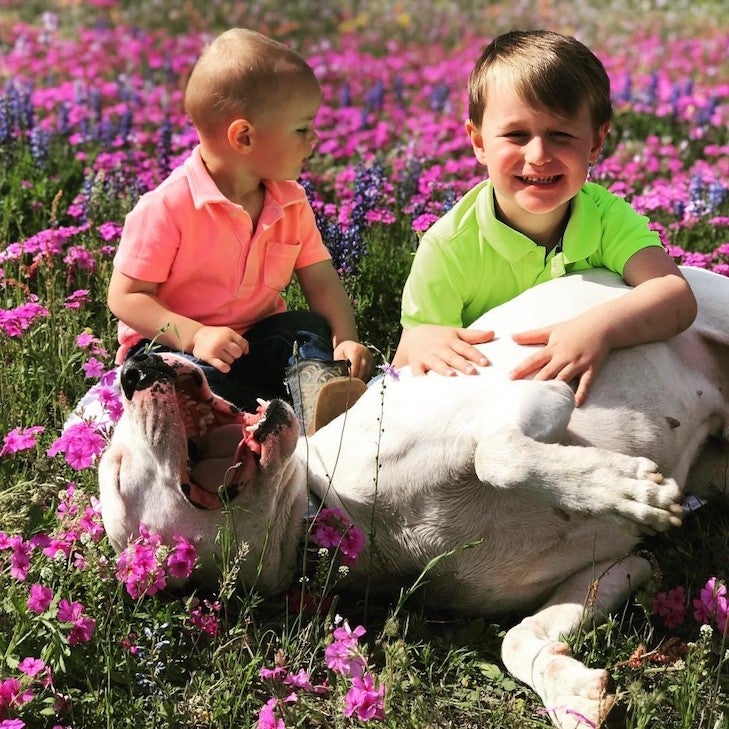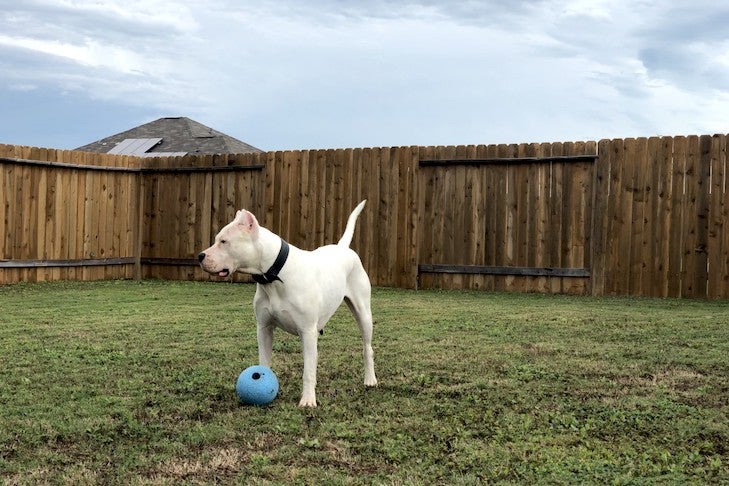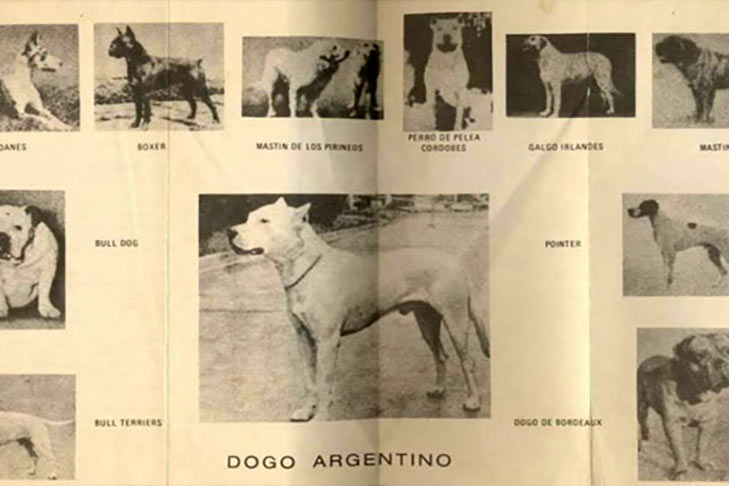
Let’s get this straight right from the outset: If you’re thinking Dogo Argentino (Dogo), you must be a leader and an experienced dog owner. In other words, firm, confident, and consistent.
That’s the clear message from Amy Collins, a Dogo Argentino owner since 2000 and secretary of the parent club, the Dogo Argentino Club of America, founded in 1985.
This fearless, yet sensitive dog, is one of two breeds joining the American Kennel Club all-breed show scene January 1, 2020, and will be competing in the Working Group.
Newly Recognized, But Not For the Novice
Collins, of Springfield, Ohio, says, “They are not for the novice. Dogos are very active and need some type of job to keep them stimulated. They can be needy and seek out attention as well. They need to know their boundaries from the outset.
“They should have a family that will engage and place a high priority on socializing them from the minute they come into their house. This is a strong-willed breed and can be very stubborn and challenging. The owner needs to have the same mentality to make it a cohesive pack. A bored Dogo can be a destructive Dogo.”
As for introducing most newcomers to a household with a resident dog or young children, Collins recommends bringing in a puppy rather than an adult, which enables the owner time to establish control, a respectful relationship, and an obedience regimen. Despite its intimidating appearance, this breed loves to be petted and craves close physical contact.
Prior to 2000, when she purchased her first Dogo, Collins had owned the following: Bull-type terrier, Chow Chow, Doberman Pinscher, Dachshund, Shiba Inu, and Jack Russell Terrier.
She was attracted to the Dogo by its “majestic and regal appearance. And as I began to study more about the breed and its intended purpose, I became intrigued by its unique character. At the time, we were raising three sons and wanted a family guardian that would be capable of handling any family activity. The Dogo Argentino fit that need with its athletic build, lasting endurance, and loyalty to the family.”

Getting to Know the Dogo
The Dogo’s identity is marked by its white coat and powerful, athletic build. Males are 24-26½ in height and weigh 88-100 pounds; females are 24-25½ tall and 88-95 pounds.
When it comes to character and temperament, the breed standard reads: “The Dogo is a strong, tenacious and rustic dog that was created to protect family and property, as well as to hunt large game and destructive predators. He is a faithful companion at home and in the field. Of all the Dogo’s attributes, he is above all else, courageous.”
Breed registrations have grown steadily since 2008 (when there were two registered litters) to 2018 with 104. Total dogs registered jumped from 11 in 2001 to 311 last year. Pups in each year’s litters – known as a complement – have moved from 15 in 2008 to 1,290 last year.
The parent club lists 195 members. The breed’s stronghold states are Texas and Florida, according to Collins.
Building a highly respected breeding program is a top priority for Collins, with an emphasis on sound temperament, solid structure, a good, strong head, and fluid movement. “A Dogo,” she says, “must be harmoniously balanced and functional.”
When it comes to genetic health issues, deafness, hip dysplasia, elbow, allergies (food and environment), cardiac and eyes are all on breeders’ radars. Reputable breeders prioritize puppies undergoing BAER (Brainstem Auditory Evoked Response) for hearing and PennHIP testing for osteoarthritis or hip dysplasia and auscultation or echocardiograms for heart function.

A Loyal Hunter and Guardian
The Dogo’s history can be traced back almost a century. It was developed by Dr. Antonio Nores Martinez, a renowned doctor, and his brother, Augustin, in 1928 in the Cordoba region of Argentina. The pair was striving for a companion that was a good pack hunter and a guardian. The foundation stock included the Great Pyrenees, Pointer, Great Dane, Dogue de Bordeaux, Boxer, Spanish Mastiff, Bull Terrier and what is now an extinct breed, the Dog of Cordoba.
It was accepted by Fédération Cynologique Internationale in 1973 as the first and only Argentinean breed, chiefly due to the passion and effort of Dr. Augustin Nores Martinez.
When it comes to AKC sports, the Dogo is well-suited for Conformation, Agility, Barn Hunt, Obedience, Tracking and Coursing. “Because our breed needs stimulation and continued activity, these complement hunting nicely,” adds Collins. They have also been successfully trained in search and rescue, police work, guard dogs, narcotic detection and Schutzhund.

Part of the Family
Collins and her husband, Beau, deploy their Dogos, along with Parker Curs (native to Louisiana) for hunting wild boar in Ohio, Louisiana, Mississippi, and Texas. “The Dogo, which has a sharp sense of smell, is designed to hunt in the packs, even if it’s not their own,” she explains.
Conditioning and stamina are key here, not only from covering miles of terrain but from taking down a wild boar that could weigh up to 300 pounds.
“The short white coat serves a purpose to differentiate the dog from the quarry, making it is easy to spot a white dog during a night hunt, Collins adds. “The areas we hunt are thick and thorny. With their coat, we use protective gear (cut vest, collars, and tracking collars) to help protect our Dogos who put their life on the line each hunt. But this is no guarantee they will not be injured. This is what they are bred to do and it also gives them a sense of purpose doing a job. They love it and it makes for a very well rounded and sociable dog.”
Wondering what a Dogo will cost you? Figure on $1,500-$3,500, says Collins. But because of the numerous caveats, only go to a reputable, experienced breeder.

